Not Green Eggs but Red Eggs & Ham!
My First Orthodox ☦️Easter + The Traditional Pascha Basket + The Greatest Easter Sermon Ever!
“Christos Anesti! Alithos Anesti! Christ is Risen! Truly He is Risen!”
“Christ is risen from the dead, trampling down death by death, and upon those in the tombs bestowing life!” (A hymn repeated throughout the Pascha Divine Liturgy Watch a sample)
Red Eggs and the Traditional Easter Basket
Not green eggs and ham but red eggs and holy ham! This was my first year making red eggs which is an Eastern Christian tradition for celebrating Pascha or Easter. The eggs are dyed red to represent the blood of Christ. The hard shell of the egg symbolizes the sealed tomb of Christ, and the cracking of them symbolizes His resurrection from the dead. Some children will play a game where they tap each others’ eggs to see which one cracks first. (Our children were to tired to play this game at 3 am in the morning, but they were certainly awake enough to fill their plates with bacon, donuts, and other sweets!)
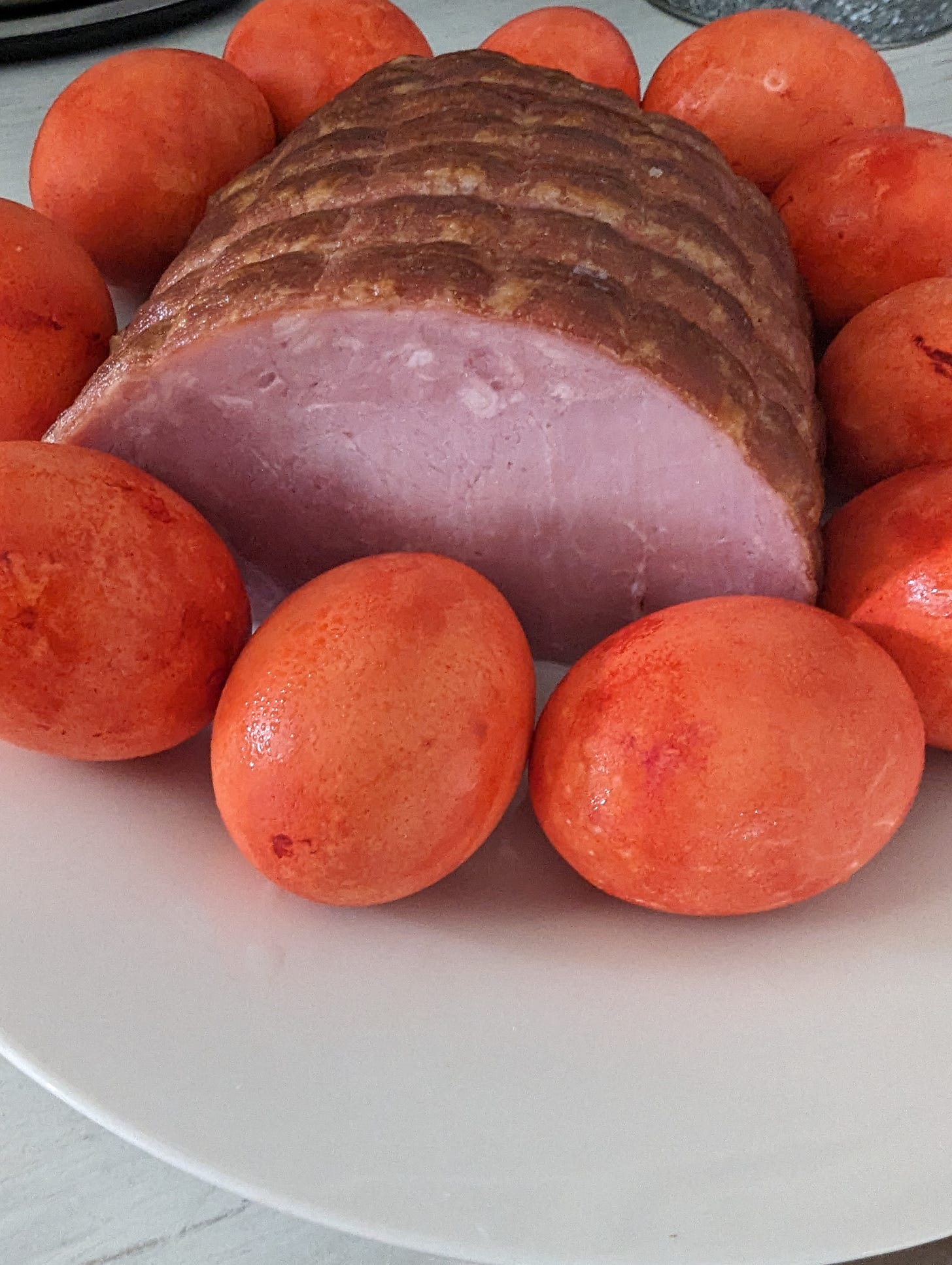
It is also a great moment to crack open your Easter Basket, which Christians bring to the service to be blessed. It is filled with meats, eggs, cheeses, butter, sweet breads, and for some, a bottle of wine (we also brought a bottle of sparkling lemonade for the kids)! Keep in mind that Eastern Christians generally fast from meat, eggs, and diary during the 40 days of Lent, and so the Easter basket is literally the joyous return of this delicious food! (Let’s just say that I ate a lot of cheese wrapped in ham, salami, and pepperoni yesterday). In this article, you can learn more about the traditional Pascha basket and the symbolism behind each item.
Midnight Pascha
Eastern Christians celebrate Easter at midnight much like how Western Christians celebrate Christmas with a Midnight Mass. Traditionally, there is a prayer service in the darkness beginning at 11 pm. As we entered, there were basil leaves spread throughout the floor. Tradition has it that basil was found growing by Christ’s tomb and now the whole church represents ‘Christ’s empty tomb.’
Around 11:30 pm, we begin to light each others’ candles and process outdoors. Once we have gone around the church, we arrive to closed doors. The priest, representing Christ, begins to bang on the doors with the authority of heaven. Here is footage from one Orthodox church that demonstrates this in the liturgy.
Priest: Lift up your gates, ye princes, and be ye lifted up, ye everlasting doors; and the King of Glory shall come in.
Reader: Who is this King of Glory?
Priest: The Lord strong and mighty. The Lord mighty in battle. THE LORD OF THE POWERS. HE IS THE KING OF GLORY.
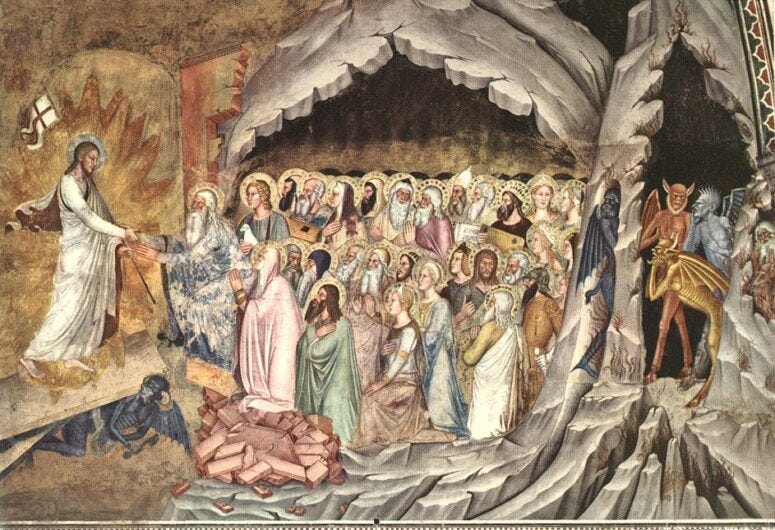
This dialogue between the priest and the gatekeeper is actually occurring between Christ and the gatekeeper of the realm of death which is the devil (or Hades personified). The priest then kicks the door open (or shoves it open) which symbolizes ‘Christ trampling down death so that all might follow Him into eternal life.’
Church bells then ring in the middle of the night, and we enter back into the church greeting each other with the phrase “Christos Anesti! Alithos Anesti! Christ is Risen! Truly He is Risen!” It was certainly one of my favorite parts of the liturgy so rich in meaning.
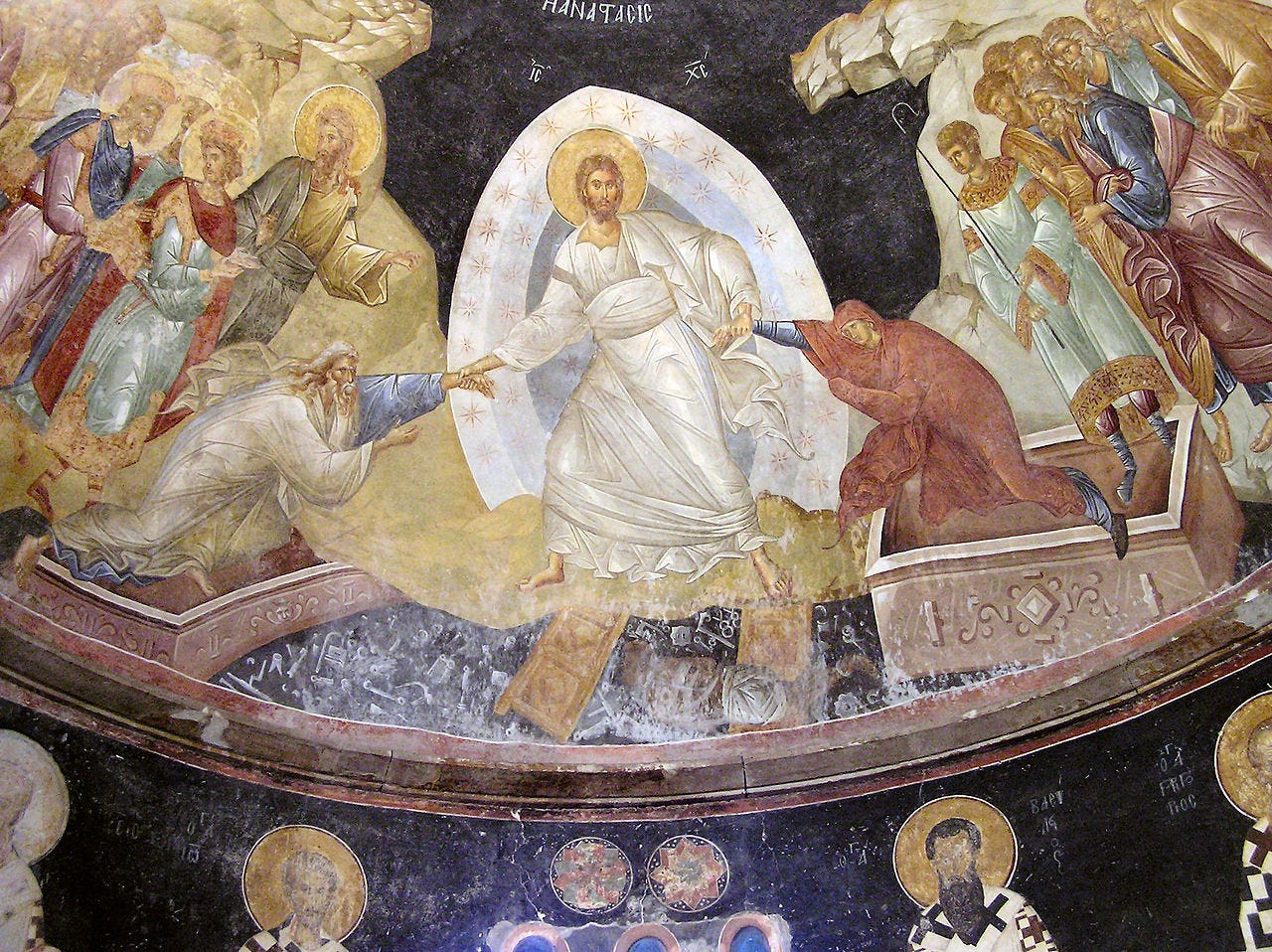
What is Pascha?
For many English speakers, we do not recognize the traditional name for ‘Resurrection Day’ which was not ‘Easter’ but ‘Pascha.’ Why is this the case? Here is one Orthodox priest explaining the history and meaning:
“The word [Easter] is an Anglo-Saxon word for a pagan festival… According to the English Church historian (St. Bede), it derives from a pagan spring festival in honor of Eastra or Ostara a Teutonic goddess. The French, Italians and Spanish… their words come from the proper source — Passover, which in Greek is the word "Pascha".
Pascha is derived from the Jewish word Pesah which means "Passover". And here there is a direct link with the New Testament. In 1 Corinthians 5:7 we read, "for our paschal lamb, Christ, has been sacrificed". According to St John, Christ was crucified at the very time that the paschal lambs were being killed. There is another link with the Old Testament because of the importance to the Jews of the Feast of the Passover. The verbal form means to protect and to have compassion as well as "passover". The experience of the Israelites was literally a "passover", but it was also an experience of both God’s compassion for his people, and a great act of protection, as for example, the passage through the Red Sea.
The crucifixion and later Resurrection of Christ took place during the Passover Feast. So for Christians Christ was clearly the Paschal Lamb, the fulfilment of all that the Passover had foreshadowed since the first Passover which celebrated the liberation of the Israelites from slavery in Egypt. Let us remember that because the word "Pascha" is in its origin a Hebrew word, by using it we are a witness to the Jewish community, for whom the Passover is still one of the most important words in their religious faith.”1
In other words, Pascha is packed with meaning that comes from Scripture and has always been the word that most cultures use for ‘Resurrection Day’ including those in the West such as Spain, France, and Italy. Perhaps we English speakers should consider bringing this word back into our lexicons in order to help our children better understand the deeper meaning of the day. (On a side note, when my son tries to say ‘Pascha,’ it always comes out as ‘Pasta’!)
The Funeral Procession of Great Friday Evening
The joy of Pascha contrasts with the sorrow and lamentations of Good Friday evening when Christ is laid to rest. In Orthodox services, Christ is hung upon the cross at 9 am with a service; another service occurs at 3 pm when Christ, the Lord of Glory, dies. At 6:30 pm on Friday night, the Church gathers to mourn the death of Christ. A shroud with the icon of Christ is carried on a bier decked out in flower by pallbearers, and it has all the sights and sounds of a royal funeral procession. You can watch a sample here.
The goal of liturgy is to worship God with one another in thanksgiving and praise, yet liturgy also helps us memorialize the sacred events of salvation history. In the context of Holy Week, the liturgy transports us mystically to the time of Jesus like a time machine or the ‘imagination station’ in The Adventures in Odyssey (a reference that only my evangelical Protestant readers will understand!). On Friday evening, it truly feels like you are joining St. Joseph of Arimathea, St. Nicodemus, and the holy myrrh bearing women in processing to the tomb and entering into it in order to mourn the Lord of Glory and hope for resurrection.
The Greatest Pascha Sermon Ever
Now back to Pascha… the priest did not give his own homily or sermon, but instead, he reads the most famous Easter homily of all time from St. John Chrysostom. You can read the full sermon below or watch me read an excerpt of St. John Chrysostom’s homily for Easter.
“Enter you all into the joy of your Lord; and receive your reward, both the first, and likewise the second. You rich and poor together, hold high festival. You sober and you heedless, honor the day. Rejoice today, both you who have fasted and you who have disregarded the fast. The table is full-laden; feast ye all sumptuously. The calf is fatted; let no one go hungry away. Enjoy ye all the feast of faith: Receive ye all the riches of loving-kindness. let no one bewail his poverty, for the universal kingdom has been revealed. Let no one weep for his iniquities, for pardon has shown forth from the grave. Let no one fear death, for the Savior’s death has set us free.”
Bright Week & the Eighth Day
We have now arrived to ‘Bright Week’ which is full of Paschal joy and celebration. It is one of the few weeks of the year that Orthodox Christians do not fast which is unusual since we fast on all Wednesdays & Fridays throughout most of the year. Bright Week transcends earthly time and transports us to the eternal rest of Heaven. This is not a normal M-F week but the eternal 8th day! Here is how one Orthodox priest describes it:
“We have two names for this week that follows Pascha. We call it, both, “Bright Week,” and “The 8th Day.” The phrase, “Bright Week,” refers to the light that Jesus has brought into the world, into our own lives, and it refers to our vocation—that we (as part of His Body) are supposed to be about the business of bringing His light to others around us. It’s the week where, being filled with Christ’s light, we become a part of the “new creation” (2 Corinthians 5:17), what we were actually created to be in the first place. That’s what the term “8th Day” refers to. When God created the universe, He rested on the 7th day, the Sabbath (Saturday). But, when Jesus rose from the grave, it was on the day after the Sabbath (the day after the 7th). Therefore, Jesus rose from the grave on the 8th day, He became the first-fruits of the new creation, the one unified with God, as the joyful sign and promise of the everlasting “Bright Week” in paradise…a never-ending week of brightness. The entire Bright Week is considered to be one continuous day.”2
So much more could be said about Pascha and Holy Week, but this article will have to suffice for now.
Have a blessed Bright Week!
And for all of my dear friends on the Gregorian Calendar, may you have a blessed Pentecost this Sunday!
Be entirely His,
Kyle
St. John Chrysostom’s Famous Pascha Homily
[St. John Chrysostom is considered one of the best preachers in the ancient world. Many of his homilies and Biblical commentaries are still read by many today. His Easter Sermon remains his most well-known and is still read aloud during Matins of Pascha in the Eastern Christian/Byzantine tradition.]
“If any man be devout and love God, let him enjoy this fair and radiant triumphal feast.
If any man be a wise servant, let him rejoicing enter into the joy of his Lord.
If any have labored long in fasting, let him now receive his recompense.
If any have wrought from the first hour, let him today receive his just reward.
If any have come at the third hour, let him with thankfulness keep the feast.
If any have arrived at the sixth hour, let him have no misgivings; because he shall in nowise be deprived thereof. If any have delayed until the ninth hour, let him draw near, fearing nothing. If any have tarried even until the eleventh hour, let him, also, be not alarmed at his tardiness; for the Lord, who is jealous of his honor, will accept the last even as the first; He gives rest unto him who comes at the eleventh hour, even as unto him who has wrought from the first hour.
And He shows mercy upon the last, and cares for the first; and to the one He gives, and upon the other He bestows gifts. And He both accepts the deeds, and welcomes the intention, and honors the acts and praises the offering.
Wherefore, enter you all into the joy of your Lord; and receive your reward, both the first, and likewise the second.
You rich and poor together, hold high festival.
You sober and you heedless, honor the day.
Rejoice today, both you who have fasted and you who have disregarded the fast. The table is full-laden; feast ye all sumptuously. The calf is fatted; let no one go hungry away.
Enjoy ye all the feast of faith: Receive ye all the riches of loving-kindness. let no one bewail his poverty, for the universal kingdom has been revealed.
Let no one weep for his iniquities, for pardon has shown forth from the grave. Let no one fear death, for the Savior’s death has set us free.
He that was held prisoner of it has annihilated it.
By descending into Hell, He made Hell captive.
He embittered it when it tasted of His flesh. And Isaiah, foretelling this, did cry: Hell, said he, was embittered, when it encountered Thee in the lower regions. It was embittered, for it was abolished. It was embittered, for it was mocked. It was embittered, for it was slain. It was embittered, for it was overthrown. It was embittered, for it was fettered in chains.
It took a body, and met God face to face.
It took earth, and encountered Heaven.
It took that which was seen, and fell upon the unseen.
“O Death, where is your sting?”
“O Hell, where is your victory?”
Christ is risen, and you are overthrown!
Christ is risen, and the demons are fallen!
Christ is risen, and the angels rejoice!
Christ is risen, and life reigns!
Christ is risen, and not one dead remains in the grave!
For Christ, being risen from the dead, is become the first fruits of those who have fallen asleep.
To Him be glory and dominion unto ages of ages.
Amen.”
http://www.orthodoxresearchinstitute.org/articles/fasts_feasts/harper_pascha_easter.html
https://www.stbasil.com/news/2020/4/23/the-timeless-week-of-light-on-the-8th-day


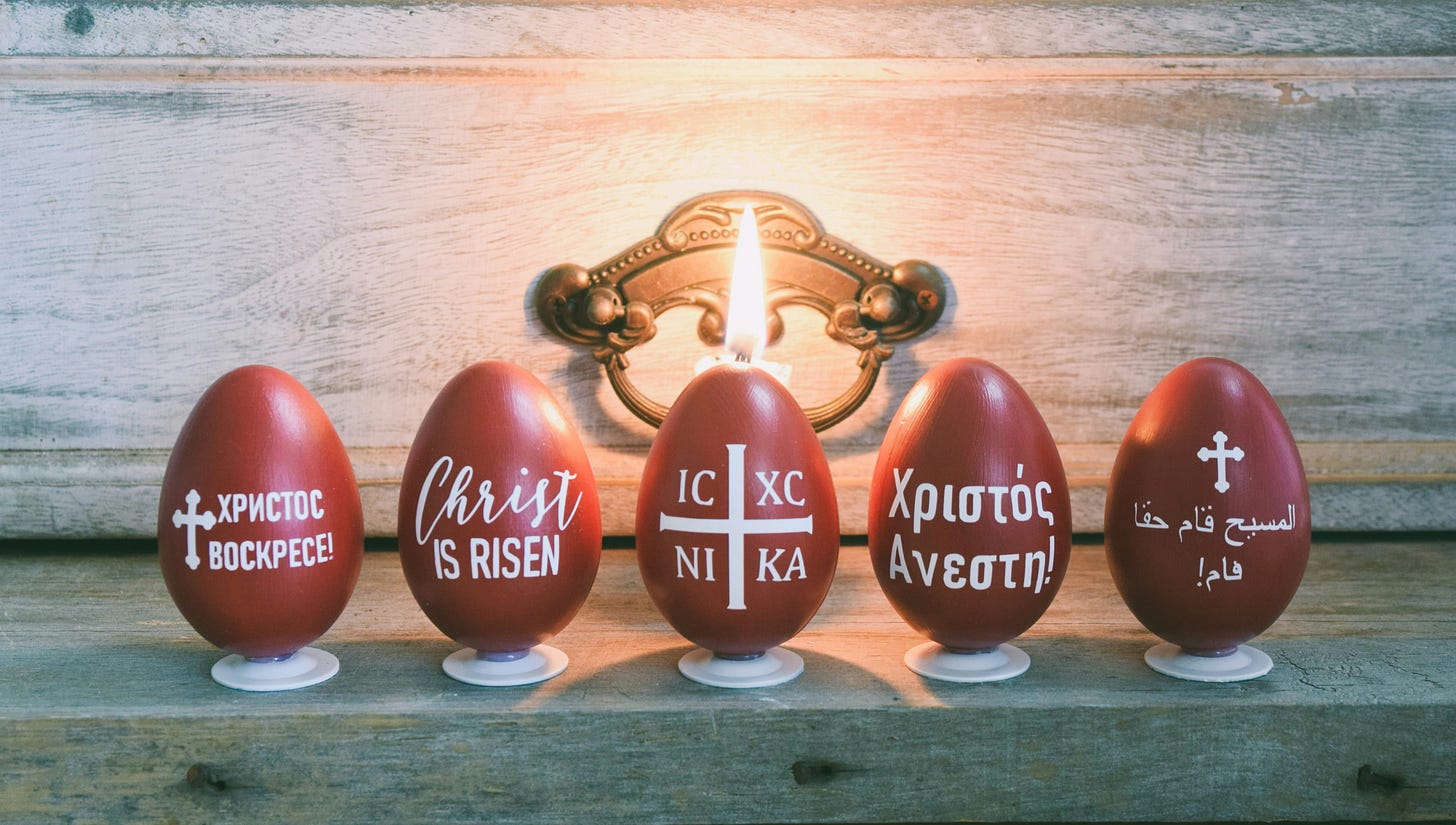
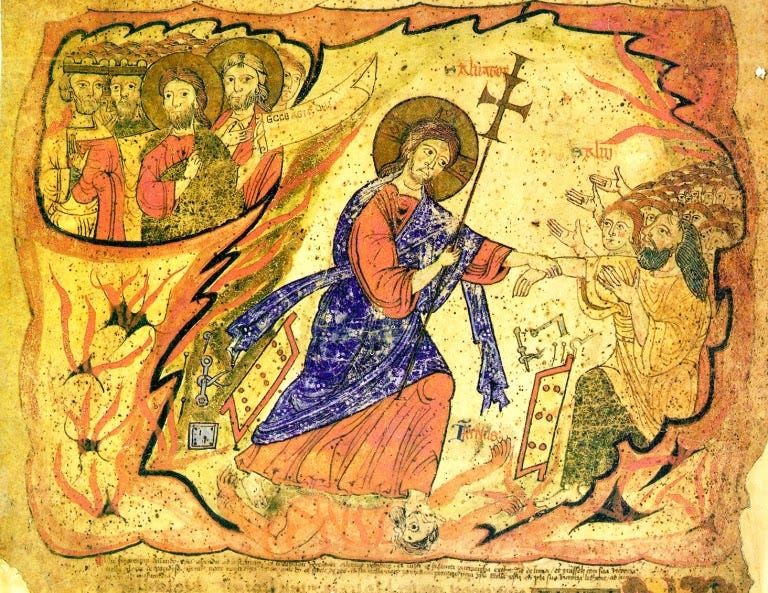

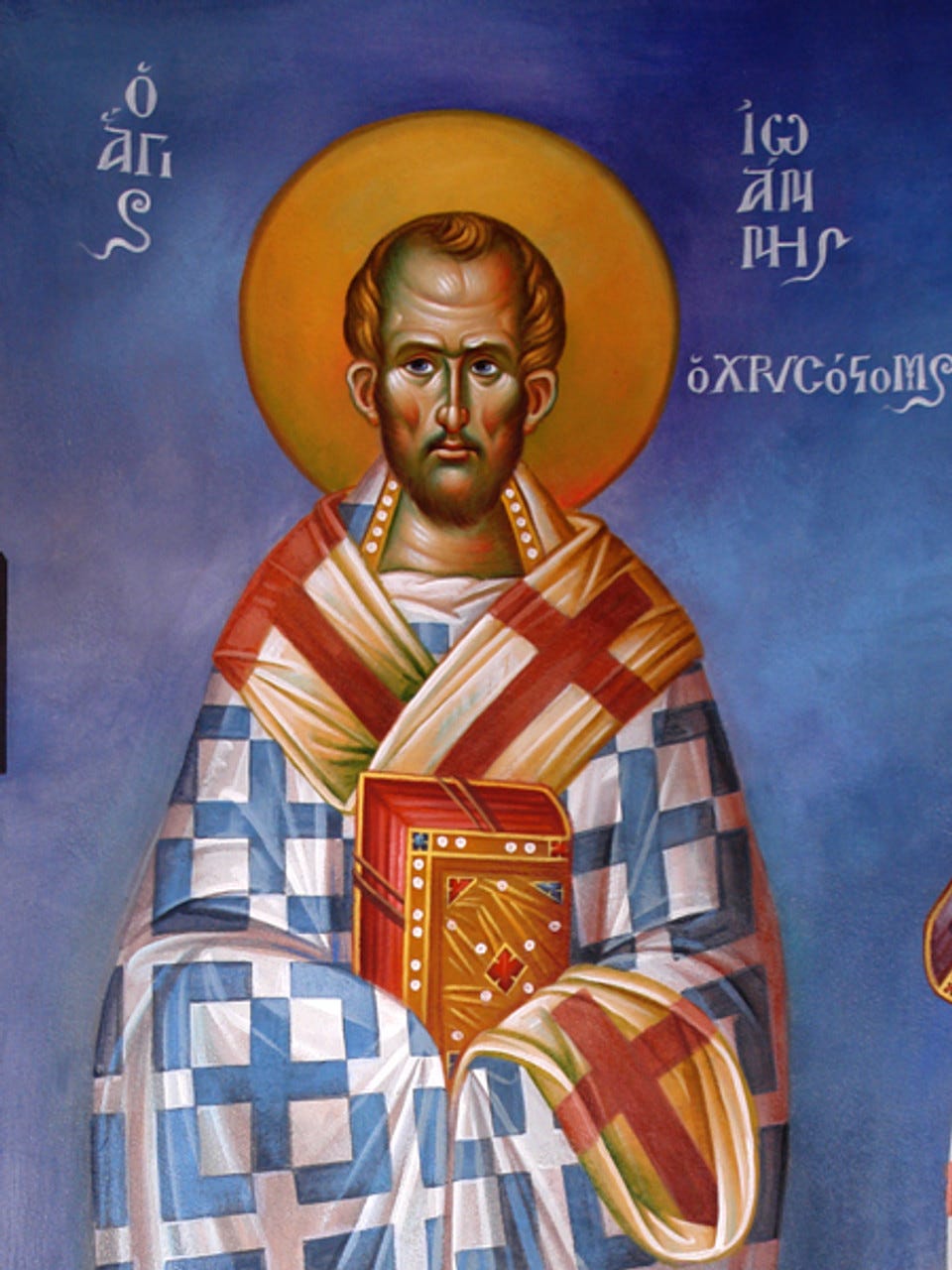
Christ is Risen!
My chrismation was on Oct 29, 2023 at the age of 76! This was my first Pascha celebration after a lifetime in various evangelical/protestant traditions. Your descriptions were wonderful.